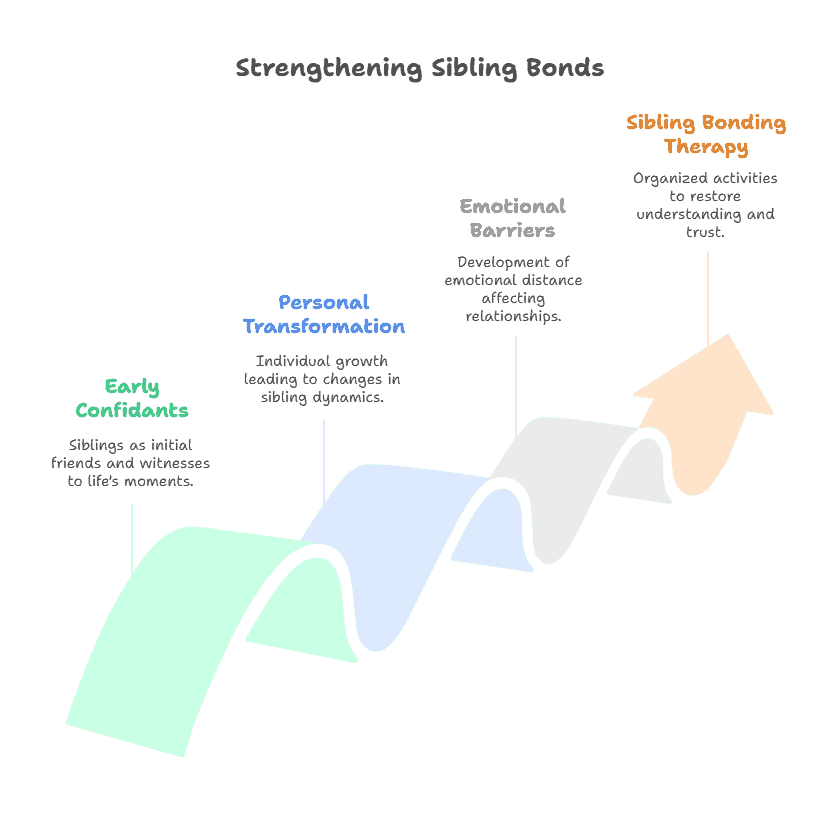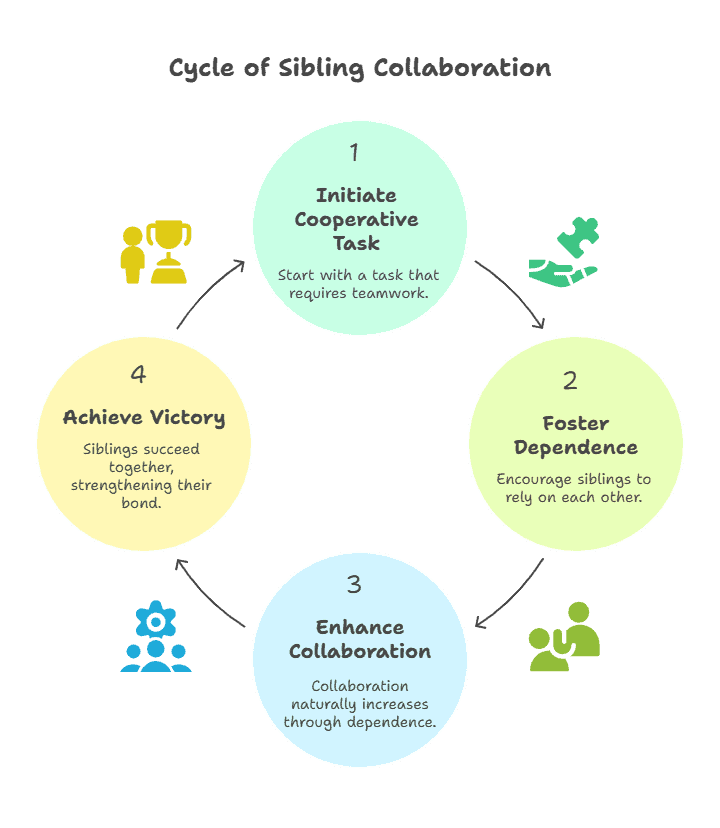Sibling relationships are among the strongest connections we have in life, or let us be honest, they might sometimes be the most convoluted ones. Childhood rivalries, teenage grudges, and adulting distances are all factors that contribute to burying love under layers of ego and misunderstanding. The better part? The situation can change. With guided sibling bonding therapy activities, brothers and sisters can rediscover their connection through play, communication, and empathy. Whether it’s building a fort, sharing laughter, or simply talking with sincerity, therapy can help turn rivalry into reliability — and chaos back into connection.

Why Sibling Bonds Matter (and Why They Break So Easily)
Brothers and sisters are those among our early confidants, sometimes even competitors, and ever-present spectators to our lives. They have witnessed our ups and downs (that includes the haircut phase, too). However, as we develop, these relationships might be affected by accountability, personal transformation, and emotional barriers.
Siblings can be regarded as our first friends, sometimes rivals, and lifelong witnesses to our life stories. They have experienced our best as well as our most embarrassing moments (yes, even the haircut phase). However, if we grow, strain may occur in these relationships because of responsibilities, personal changes, and emotional distances.
In fact, the affection between siblings does not disappear but rather covers itself under unexpressed feelings. Sibling bonding therapy activities come at this point — organised and fun methods that help siblings to restore their understanding, kindness, and trust.
What Are Sibling Bonding Therapy Activities?
Think of sibling bonding therapy as a relationship tune-up for brothers and sisters. These activities are designed by therapists to help siblings:
- Communicate openly and kindly
- Develop empathy and emotional understanding
- Relearn teamwork through shared tasks
- Replace rivalry with respect
And no, it’s not all serious talk and emotional monologues. Many of these activities involve art, laughter, games, and even cooking! Therapy here is less about “fixing” and more about rediscovering.
When siblings play together with purpose, they unconsciously rebuild the emotional bridge that connects them.
Common Causes Behind Sibling Disconnection
Before exploring the “how,” it’s essential to understand the “why.” Some common factors include:
- Parental comparisons: Being measured against one another creates lasting resentment.
- Unequal attention: Feeling unseen or overshadowed fuels competition.
- Jealousy and ego: Simple misunderstandings can snowball into prideful silence.
- Life transitions: Moving away, marriage, or career demands reduce interaction.
- Unresolved childhood patterns: Old wounds rarely stay in childhood—they grow with us.
Acknowledging these causes helps siblings approach therapy with honesty and empathy, rather than blame.
Activities That Heal: From Laughter to Listening
Therapy is not always recognisable as therapy. A lot of time, laughter, collaboration or just a common goal can be the starting point of healing. Out of the therapist’s top-approved activities come the ones that help siblings bond easily and without any disruption.
1. Cooperative and Creative Activities
Build a Fort or Solve a Puzzle Together
Sounds simple? It is — and that’s the magic. Team activities encourage siblings to cooperate rather than compete, turning “I’ll do it my way” into “let’s do it together.”
Create a Family Collage
Collecting old pictures, magazines, and glue sticks is the first step. Working on a collage together not only gives the siblings a chance to remember the good times but also to “piece together” their common history literally.
Cook or Bake Together
The kitchen is a therapy room that is often overlooked. Making food can be a way of exercising virtues like patience, understanding and compromise (“You can’t put that much salt!”). Additionally, nobody loses when the matter of dessert comes in.
2. Communication and Emotional Understanding
Emotion Charades
Take turns acting out emotions while the other guesses. It’s lighthearted but helps siblings recognise and understand emotional expressions better — a skill that adults often forget.
Storytelling Chain
Start a story and let each sibling add one line. The result? Chaos, laughter, and collaboration. It’s a fun exercise in listening and co-creation.
Feelings Circle
Sit down together and share “I feel…” statements. This builds trust and emotional safety, turning tension into vulnerability.
Happy Memory Hour
Revisit funny or wholesome childhood moments. Nostalgia softens walls faster than lectures ever can.
3. Outdoor and Physical Bonding
Scavenger Hunts
Turn a competitive task into a cooperative one. When siblings must rely on each other to win, teamwork naturally strengthens.
Game Nights or Sports Time
Regular play sessions — even board games or a badminton match — rebuild trust and spark joy. The key is consistency and laughter, not competition.
Walks or Nature Time
There’s something about walking side by side that makes conversations flow effortlessly. Fresh air often invites fresh perspectives.

4. Reflective and Faith-Based Activities
Gratitude Sharing
Ask each sibling to mention one thing they appreciate about the other. It’s simple but emotionally powerful, especially when done weekly.
Sibling Summits
Consider it as a family reunion – without the formalities. Talk about the current situation, the problems, and the solutions that will definitely lead to improved cooperation as well as setting some little objectives.
Spiritual Reflection (for Muslim Families)
Reflecting together on Qur’anic teachings about forgiveness, compassion, and kinship can turn faith into a foundation for emotional growth. Sharing short verses or stories reinforces unity under shared spiritual values.
How Therapists Use and Guide These Activities
In therapy, sibling bonding therapy activities are carefully guided and customised for each family. Therapists observe how siblings interact, helping them recognise behaviour patterns, express emotions calmly, and rebuild communication through play instead of pressure. It’s a safe space where brothers and sisters can laugh, reflect, and reconnect — and the same techniques can later be practised at home to keep their bond strong.
The Role of Faith and Islamic Counselling in Strengthening Sibling Relationships
Counselling based on faith, like Islamic Couples Therapy, instils the main morals that can be utterly applied to brotherly and sisterly bond — love (Rahmah), endurance (Sabr), pardon, and esteem. These virtues help close people in a family to see one another not as rivals but as partners in God and life.
Therapists using Islamic approaches guide siblings to heal emotional wounds by integrating spirituality into emotional wellness. It helps them practice empathy through a moral and spiritual lens, promoting peace and understanding within the family.
What This Means for You
At Inner Peace Therapies, we hold the view that every family is entitled to the peace that lasts. Our therapists are very gentle and provide guidance that is informed by faith to connect the families again, no matter if it is through Islamic Couples Therapy for marital support or through sibling-centred sessions for reinforcing the brother-sister bonds.
We help families recognise emotional patterns, introduce practical bonding exercises, and build bridges where silence once stood. With tailored sibling bonding therapy activities, we not only help couples rediscover love but also guide siblings toward forgiveness, empathy, and lasting unity.
Because at the heart of every peaceful home lies not perfection, but loyalty, laughter, and love that never gives up — even after a few sibling pranks along the way.





